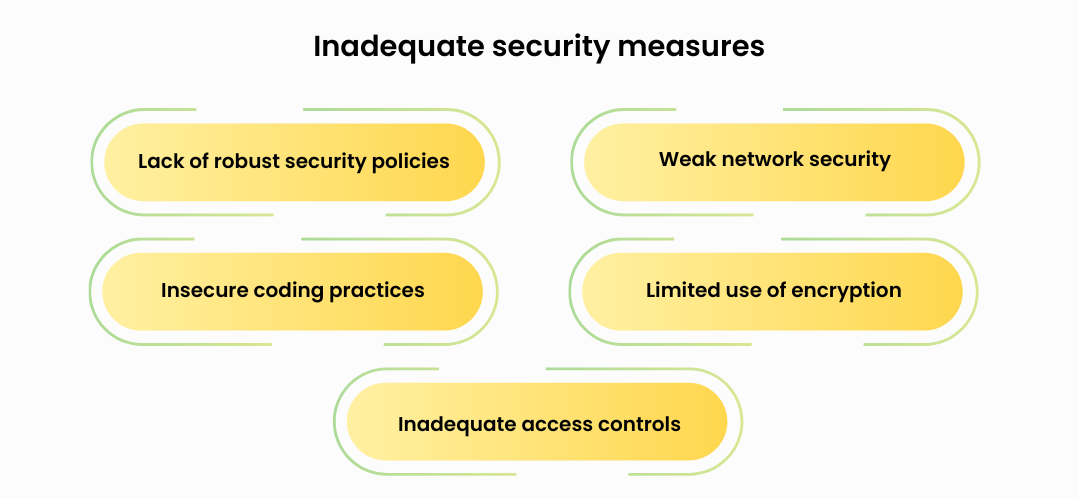Quick Summary: Discover the security risks associated with offshoring software development. Obtain practical tips on how to mitigate these challenges to maximize your projects' efficiency and success.
Introduction
Offshore software development has become a popular strategy for businesses seeking access to a global talent pool for specialized skills and cost-effective solutions in the rapidly evolving technological landscape.
However, while it offers many advantages, offshoring can also pose security risks. But it doesn't have to be this way! With the best security practices in place, you can ensure higher security assurance for your offshore development projects. In this blog, we've gathered the most common security risks associated with offshore software development and how to mitigate them. Keep reading to learn more.
Key Takeaways
- Offshore teams might have weak security frameworks. Businesses can address this by implementing ISO 27001 and CIS controls to establish uniform security procedures.
- Offshore handling of sensitive data may lead to breaches. Implementing encryption of data, multi-factor authentication, and role-based access control can ensure secure access.
- Communication gaps increase security risks, but by maintaining transparent communication and regular reporting, businesses can reduce the chances of the occurrence of the risk.
- Offshore developers might not adhere to secure coding standards. It's important to employ automated security scans and conduct code reviews to detect vulnerabilities at an early stage.
- When working with offshore teams, there is a significant risk of intellectual property theft. To mitigate this risk, it's crucial to enforce non-disclosure agreements (NDAs) and include IP protection clauses in contracts.
Security Risks in Offshore Software Development and Associated Mitigation Strategies
Offshore software development can pose security risks for companies. These risks include weak security protocols, theft of intellectual property, and inadequate data encryption. Without strong access controls and oversight, unauthorized access or data breaches may occur. To address these vulnerabilities and ensure data protection, mitigation strategies are essential. Let's check out some of the common security risks and ways to mitigate them.
1. Intellectual Property Risks
Protecting your ideas and creations is a big challenge. Without good data protection, businesses risk having their unique codes, designs, or other project details stolen. For example, a tech startup that hires an outside company to develop a new app might have its special algorithms copied or stolen.
“According to the United States Intellectual Property Commission, IP theft costs US businesses billions of dollars every year.”
From the risks of infringement issues to IP thefts and poor contract management, everything may lead to IP risks.
How to mitigate the challenge?
The offshore partner needs to follow certain standards for information security processes. These include ISO 27001:2013, PCI DSS, ISO 9001:2015, GDPR, and HIPAA. These standards help us ensure that we are using best practices to protect information, manage risks, and keep data safe.
In order to mitigate intellectual property issues, you must
- Establish clear legal protections.
- Partner with a reliable and qualified legal professional
- Draft contracts and agreements that clarify the intellectual property rights like copyrights, patents, and trademarks.
- Sign NDAs and other legal documents to ensure the protection of confidential information.
- Implement strict access controls and monitoring procedures.
2. Shrinking Transparency
Transparency is one of the crucial concerns that often needs to be addressed. Whenever you hire developers from a different region, maintaining transparency becomes a key concern.
When working with offshore development teams, time zone differences, geographical distance, and cultural gaps, everything can lead to a lack of visibility in routine operations.
This can often lead to security blind spots and miscommunication that can put sensitive data at risk.
How to mitigate the risk?
Since the disruptions can cause the security risks within the organizations, you must employ the following practices:
- Establish clear communication channels to obtain regular updates, progress reports, and more.
- Use real-time communication tools like Microsoft Teams, Slack, and Skype.
- Use clear security performance metrics in service agreements.
- Implement shared dashboards for tracking vulnerabilities and security issues.
- Use version control tools like GitLab or GitHub to monitor code changes, review security implementations, and track commits.
- Adopt agile development methodologies for regular sprint reviews.
- Conduct independent third-party security audits to review the offshore partner's adherence to best security practices.
3. Unencrypted Data Exchange
Ample organizations often struggle with the potential issue of unencrypted data exchange. There are instances when businesses provide unauthorized access to resources to the remote team.
This data exchange between the in-house and offshore teams with no appropriate encryption protocols can lead to financial losses and data breaches.
How to mitigate the risk?
Implementing encryption techniques like end-to-end encryption (E2EE), using Virtual Private Network (VPN), and Secure File Transfer Protocol (SFTP) can help mitigate the risk.
By adopting these encryption techniques, businesses can secure their data while establishing a secure collaboration with offshore teams.
4. Malicious Insider
When you partner with an offshore software development company, you may have little control over the team members.
It's important to be cautious about the security of critical project information, as the possibility of someone having malicious intentions for your company can be a significant risk.
Although the risk is generally low when working with offshore teams, it's essential to mitigate any potential security risks.
How to mitigate the risk?
Whenever you select offshore development services, you must ensure that you partner with a reliable offshoring development company. Other than this, you must
- Verify the relevant experience.
- Look for references
- Consider word of mouth.
5. Data Security Concerns
Offshore software development poses data security risks. Working with a remote development team may increase the risk of data breaches or other security vulnerabilities, especially if sensitive or confidential information is involved.
Data security is a significant concern for 68% of businesses that are considering expanding offshore.
How to mitigate the risk?
To mitigate the data security concerns, you must,
- Implement strict data security protocols.
- Ensure your team follows industry-standard security practices, such as encryption, firewalls, and access controls.
- Limit access to sensitive information to authorized team members and enforce strict data protection policies.
- Consider getting third-party security audits or penetration testing to find and fix any vulnerabilities.
6. Improper authentication
Improper authentication represents a significant security challenge not only in offshore development but in all development scenarios. It is no surprise that poorly managed or implemented authentication mechanisms lead to data breaches and even system vulnerabilities.
Insecure token management, weak password policies, a lack of role-based access control, outdated authentication protocols, and even the absence of multi-factor authentication can all lead to significant security challenges.
However, adopting some of the practices can help mitigate the challenge.
How to mitigate the risk?
Several best practices of offshore software development ensure the risk mitigation of improper authentication. Below are some use them:
- Set a strict password policy that requires a combination of numbers, special characters, and upper and lowercase letters.
- Enforce policies that require users to change their password periodically.
- Use multi-factor authentication for critical data access.
- Encrypt authentication tokens to prevent attackers from using them.
- Implement role-based access controls by defining access levels to ensure that only users with access can obtain relevant information.
- Ensure TLS protection is maintained for all authentication-related communication.
7. Third-Party Data Breach
Offshore software development offers many benefits, such as access to global talent and cost efficiency, making it a promising option for business growth. However, it's important to be aware of the potential security risks that can lead to system disruptions, such as third-party breaches compromising security systems.
This might be due to plenty of reasons like the involvement of multiple stakeholders, weak security practices, frequent data sharing, and insecure APIs and integrations.
How to mitigate the risk?
In case of a security breach, immediately put the organization’s incident response plan into action. This plan should clearly state who does what, how to communicate, and the steps to contain and minimize the breach. To mitigate third-party breach risks, ensure to implement the following:
- Verify third-party vendors for relevant data security standards like ISO 27001 compliance.
- Incorporate the data protection and data handling protocols mentioned in the contracts.
- Implement strong encryption protocols to safeguard data during storage and transmission.
- Secure third-party API integrations by enforcing encryption, regular vulnerability assessments, and access controls.
- Perform regular audits of third-party systems that have access to your data.
- Use real-time monitoring tools to identify any unauthorized access or suspicious activity.
8. Compliance and Legal Issues
Offshore development center setup often comes with varied security risks. One of the most complex parts is dealing with compliance and legal issues. When working with offshore partners, organizations must navigate diversified data protection laws, legal frameworks, and regulations.
There might be scenarios where the offshore team might not be complying with the General Data Protection Regulations (GDPR), licensing compliance, cybersecurity regulations, and contractual obligations.
How to mitigate the risk?
To ensure secure compliance with the offshore partners, the organizations must,
- Choose an offshore software development company that complies with cybersecurity regulations and relevant data protection laws such as GDPR and HIPAA.
- Create comprehensive contracts that outline IP rights, legal responsibilities, and compliance obligations.
- Create Data Processing Agreements (DPA) for projects involving sensitive data.
- Implement strong Non-Disclosure Agreements (NDAs) to protect trade secrets, sensitive data, and proprietary information.
- Work closely with offshore teams to monitor the use of licensed software, libraries, and open-source code.
9. Inadequate Security Measures
Offshore software development can be a good option for companies looking for affordable and skilled resources. However, it also comes with security risks, such as inadequate security measures.
Offshore teams may not have the right infrastructure, rules, or understanding to keep high-security standards. This could potentially expose the client’s data, intellectual property, and systems to cyber attacks.

How to mitigate the risk?
To ensure that you maintain the highest security standards, you must,
- Implement standardized security frameworks like NIST, CIS Controls, and ISO 27001.
- Use firewalls, VPNs, and intrusion detection systems (IDS) to protect the offshore development environment.
- Enforce secure coding practices like regular code reviews and automate security scans.
- Integrate security into every stage of the software development lifecycle (SDLC).
- Implement automated patch updates for known vulnerabilities to avoid exposure to the risks.
- Conduct regular vulnerability evaluations to determine outdated and unpatched systems.
- Use strong encryption standards such as AES-256 for data storage and TLS/SSL for data transmitted over the network.
- Implement Multi-factor authentication to add an additional security layer.
Bottom Line
Offshore development centers offer a myriad of benefits to businesses. However, it also poses unique challenges to data security and compliance.
However, organizations can protect their data with reduced risk by implementing robust security measures, complying with the relevant rules and regulations, fostering cultural understanding, and maintaining effective communications.
At 'Your Team' in India, we specialize in addressing these unique challenges. We implement robust security measures and ensure your data protection with no risks involved. Contact the YTII development experts to begin your project today!
Maximize your development potential by choosing India as your ODC location
Partner with YTII to set up your own ODC in India. We have the expertise and local presence to help you seamlessly build and manage your ODC in India.







